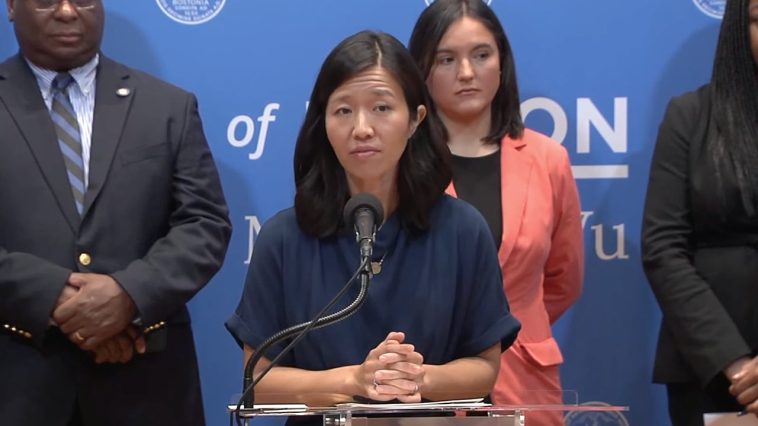Boston’s first Asian-American Mayor, Michelle Wu, recently shared a light-hearted shot from her holiday party, celebrating ‘elected officials of color,’ despite facing some critique for not including white lawmakers in the gathering. A candid picture of 17 individuals basking in the joy of the occasion at a dinner table made its way to Wu’s Instagram, capturing the essence of the exclusive Wednesday get-together.
The caption that followed highlighted Wu’s pride in the increase of minority leaders within various levels of the Boston governance system – city, state, county, and federal. Hosting such an annual event allowed her to reflect on the growth of diversity within the bureaucratic landscape. The photo was a representation of a brotherhood of elected officials of color, highlighting their concerted efforts in steering the governance of the city.
An unexpected incident took place earlier in the week that rang some bells. An invitation was inadvertently extended to the entire city council, inviting them to the holiday dinner party at the historic Parkman House, nestled near the Massachusetts Statehouse. This was followed by a rectification email sent from Wu’s staff member, almost instantly, amending the mistake.
One must take into account that Boston’s city council is a blend of 13 diverse members – six from minority groups and seven white members. The dinner party was conceived and executed under the assumption that white council members wouldn’t be a part of it. This led to a wave of critique from sections of the society who viewed the event as exclusionary.
The holiday event faced some stark criticism, painting it as discriminatory and anti-white. TV commentators like Fox News’ Greg Gutfeld implied that Wu had demonstrated a streak of ‘blatant racism’ in the past and continues to do so. The invitation excluding the white council members also sparked debate, with one white council member labelling it as ‘unfortunate and divisive,’ as per Boston Herald’s report.
However, there was also a response from the other side of the spectrum. Brian Worrell, a Black City Councilor, stood up in defense of the party. He presented the view that the party wasn’t fashioned as an exclusive club, but as a representation of ‘all kinds of special groups’ that are part of the Boston government.
Wu stood strong amid the brewing storm and continued promoting the virtue of diversity. She reflected on the rise in numbers of minority legislators since she first joined the city council in 2014. Her celebration of diversity in the face of outright criticism offers a unique perspective on inclusivity in public service.
She typed down a heartfelt note recalling her initial days in the council, ‘Not too long ago in Boston, we didn’t need such a big table to fit electeds of color.’ During her tenure as a city councilor and as a Mayor, she appreciated the growth of the group and their efforts in creating space for mentorship among those shattering societal barriers and stereotypes.
Wu’s chief spokesperson, Ricardo Patrón, affirms that the dinner party did not utilize any city resources or funds. This assurance is crucial in ensuring that the celebration did not impinge on any taxpayer’s rights or resources.
The online reaction to the meeting was polarized. Some users did not hesitate to express their dissatisfaction with the Mayor’s actions. However, it was alleged that Wu was selectively curating the comments section.
Counter to the voices of dissent were those that applauded the representation of diversity. ‘Great to see such diversity! Every American should see themselves represented in their elected officials!’ wrote one supportive party, celebrating the representation of racial minorities within Boston’s government.
Additional voices joined the chorus of support, one of whom bespoke of the long-standing predominance of white people in power and applauded the party as a step towards changing that narrative. These supportive voices reflect a portion of the demographic that appreciates Wu’s efforts in promoting diversity.
Such debates bring to the forefront the significance of representation and inclusive governance, sparking deep conversations on how our democratic mechanisms should look like moving forward. As these discussions evolve, the crux of the argument seems to center on fairness, equality, and above all, the importance of diversity in leadership.


